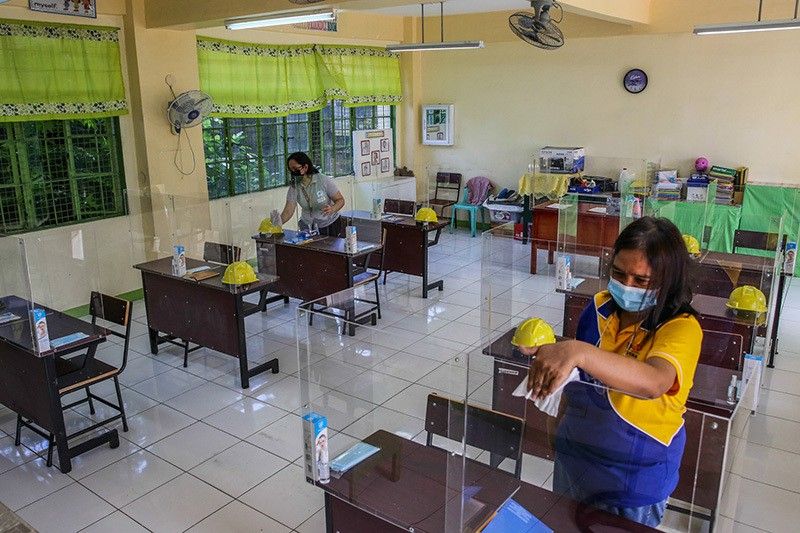Philippines approves limited return to classroom learning

MANILA, Philippines (Updated 1:20 p.m.) — The Philippines on Monday moved closer to a limited reopening of schools that had been shut more than a year due to the coronavirus pandemic, with President Rodrigo Duterte finally giving approval.
Before this, the United Nations Children's Fund said the Philippines and Venezuela are the last countries that have yet to allow a safe return to classrooms.
The Philippines closed schools in March 2020 as the health crisis unfolded at home to become among Southeast Asia's worst coronavirus outbreaks.
There is no official date yet for the start of the pilot run, nor a list of schools selected for this.
But Education Secretary Leonor Briones said this would be done initially for two months in 100 public schools in areas deemed "low risk" by the Department of Health.
She added schools would also need to pass the Department of Education's safety criteria assessment, and would require support of local governments and parents' written consent to allow their children to participate.
"We will start with 100 schools to observe how it will work," said Briones at a Palace briefing in Filipino, "then we will add 20 private schools that would submit their plans."
Under approved guidelines, the pilot run would be for Kindergarten up to Grade 3 in basic education, and for technical vocation students in senior high school.
Briones said class size would be a maximum of 12 students in Kindergarten, 16 in Grades 1 to 3, and 20 in five senior high schools.
School hours for basic education were set for three hours and four hours for those in senior high. Presidential spokesperson Harry Roque said, too, that it would be done only every other week.
"If the pilot study is safe, we will gradually increase," Briones added. "But we will watch closely the risk assessment. If there are changes, we will stop it like in other countries."
Classes in the Philippines officially began on September 13, with remote learning still the setup for over 28.2 million students.
Groups have long warned of the negative impact of prolonging students' learning in their homes, with many difficulties seen from the setup in its first year of implementation.
Follow this thread for updates on when classes will resume, and how those classes will be conducted.
Photo: Students wearing protective face masks have their temperatures taken while entering their college campus in Manila on January 31, 2020. AFP/Ted Aljibe
DepEd says School Year 2022-2023 "shall open on Monday, August 22, 2022, and shall end on July 7, 2023. It shall consist of 203 school days or as may be determined by further issuance/s in case of changes in the school calendar due to unforeseen circumstances."
Sen. Nancy Binay calls on the Commission on Higher Education and the inter-agency task force on COVID-19 not to "burden" students over requirements for face-to-face classes.
Higher educations students are being required to present medical insurance and other documents before participating in face-to-face classes.
“This is a cumbersome and unnecessary requirement para sa college students, considering that by law, all Filipinos are automatic members of PhilHealth. Sa totoo lang, 'di kailangang dagdagan ang proseso, dapat nga mas simplehan pa,” Binay says.
The Department of Education announces that it will increase the number of participating schools in the pilot implementation of face-to-face classes.
"The expansion of the number of pilot schools will allow a greater degree of experience among all our regions that will serve us well for the expanded phase of face-to-face classes," DepEd says.
With the approval of the Office of the President, the Department of Education is announcing that it will increase the number of participating schools in the pilot implementation of face-to-face classes.
— DepEd (@DepEd_PH) November 11, 2021
Read: https://t.co/cCqC91kZPw pic.twitter.com/Us3GvFxp1F
COVID-19 immunization has started for tertiary students in Ilocos Norte as part of the massive vaccination campaign of the Commission on Higher Education.
This in preparation for the reopening of in-person tertiary classes, CHED-Regional Office 1 said as a ceremonial vaccination of students at Mariano Marcos State University was held on Monday in collaboration with the Department of Health, Department of Interior and Local Government, the provincial government and Mariano Marcos Memorial Hospital and Medical Center.
About 800 students are expected to be inoculated through the CHED immunization drive.
Prior to this, MMSU had already vaccinated 75% of its student population. — The STAR/Artemio Dumlao
President Rodrigo Duterte has authorized limited face-to-face classes for the following programs:
- Engineering and Technology programs
- Hospitality/ Hotel and Restaurant Management
- Tourism/ Travel Management
- Marine Engineering
- Marine Transportation
Commission on Higher Education Chairman Popoy De Vera, who made the announcement, said the authorization applies to "degree programs that require hands-on experience in higher education institutions under Modified General Community Quarantine."
- Latest
- Trending



























